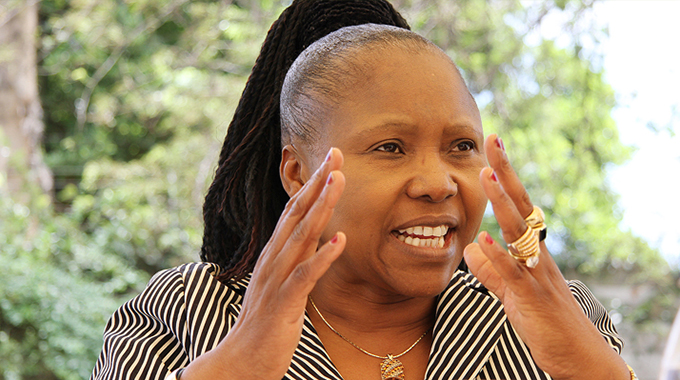Minister launches observers’ assessment of Namibia polls

Mashudu Netsianda, Senior Reporter
DEFENCE and War Veterans Affairs Minister Cde Oppah Muchinguri-Kashiri who is leading the Sadc Electoral Observer Mission (SEOM) has launched the regional observers assessment of Namibia’s Presidential and National Assembly elections to be held on November 27.
A total of ten candidates are expected to run for the presidency.
Cde Muchinguri-Kashiri is in Namibia following her appointment to lead the SEOM by President Mnangagwa who is the chairperson of the Sadc Organ on Politics, Defence and Security Cooperation.
The SEOM will assess the pre-election, election and post-election period in Namibia.
In a statement, Cde Muchinguri-Kashiri said the SEOM will issue its preliminary statement on November 29 and the final statement will come out 30 days after the end of the electoral cycle. “Let me also take this opportunity to encourage all stakeholders to ensure that these elections are conducted in a peaceful, free, fair, transparent and credible manner,” she said.
Cde Muchinguri-Kashiri said Sadc has developed a number of strategic instruments and mechanisms for the promotion and consolidation of democracy.
“The central instrument for assessing elections is the revised Sadc principles and guidelines governing democratic elections (2015), which is not only informed by relevant conventions of the United Nations such as the Universal Declaration of Human Rights and the International Covenant on civil and political rights but also by the African Charter on Democracy, elections and governance (2007),” she said.
Cde Muchinguri-Kashiri said since the end of apartheid, there have been notable incremental developments in the Republic of Namibia toward the consolidation of democracy consistent with the shared vision of the Sadc Treaty which enjoins member States to build institutions that are democratic and legitimate.
“The history of Namibia’s transition to democracy is one that is central to the struggles and triumphs of the region as a whole. You may recall that the formation of Sadc in 1992 emanated from a common unity among the countries of Southern Africa – under the stewardship of the Frontline States whose principal aim was to roll back colonialism and apartheid in order to establish an environment conducive to regional integration and democratic development,” she said.
Cde Muchinguri-Kashiri said Sadc member States remain committed to a regional economic community characterised by peace and stability which is anchored on shared political values and democratic institutions and underpinned by the international conventions of the African Union (AU) and the United Nations (UN).
“To further strengthen this shared democratic vision, Sadc has developed a number of strategic instruments and mechanisms for the promotion and consolidation of democracy. The Presidential and National Assembly Elections in the Republic of Namibia mark yet another important milestone in the country’s history, and an opportunity for all Namibian citizens to participate in the nation’s Presidential and National Assembly Elections,” she said.
“As Namibia approaches 30 years of independence, we must take time to reflect upon the tremendous strides made in deepening the culture of democracy anchored by a rights-based constitutional and legal framework.”
In conformity with the revised Sadc Principles and Guidelines Governing Democratic Elections (2015), the deployment of SEOM was preceded by a Pre-Election Assessment Goodwill Mission of the Sadc Electoral Advisory Council (SEAC) from September 16 to 20 this year.
The SEAC Mission engaged key stakeholders who raised a range of critical issues which will inform the Preliminary and Final Statements of the SEOM.
The SEAC concluded, at the end of its Goodwill Mission, that the Republic of Namibia is prepared to hold the Presidential and National Assembly Elections on 27th November 2019.
“In this respect, the Sadc Electoral Observation Mission will assess the conduct of these elections in line with the Laws of the Republic of Namibia and the provisions of the revised Sadc Principles and Guidelines Governing Democratic Elections (2015). In addition to the provisions of the Constitution and Electoral Laws of the Republic of Namibia, our assessment will be based on the tenets stipulated in the revised Sadc Principles and Guidelines Governing Democratic Elections (2015) which include full participation of the citizens,” said Cde Muchinguri-Kashiri.
The SEOM to the 2019 Namibian elections consists of a total of 53 personnel from eight Sadc countries which include Botswana, Lesotho, Malawi, Mozambique, South Africa, Tanzania, Zambia and Zimbabwe.
Cde Muchinguri-Kashiri said observers will be deployed to all 14 regions of Namibia with the SEOM focusing on the pre and post-election periods which includes the campaigns, the voting day activities and the process of the counting of the ballot papers.
“As Sadc, we look forward to an electoral process that adheres to democratic values and principles envisioned in our Sadc Treaty, the Protocol of Politics, Defence and Security Cooperation; and the revised Sadc Principles and Guidelines Governing Democratic Elections (2015),” said Cde Muchinguri-Kashiri. — @mashnets












Comments